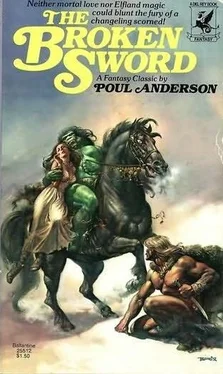Poul Anderson - The Broken Sword
Здесь есть возможность читать онлайн «Poul Anderson - The Broken Sword» весь текст электронной книги совершенно бесплатно (целиком полную версию без сокращений). В некоторых случаях можно слушать аудио, скачать через торрент в формате fb2 и присутствует краткое содержание. Жанр: Фэнтези, на английском языке. Описание произведения, (предисловие) а так же отзывы посетителей доступны на портале библиотеки ЛибКат.
- Название:The Broken Sword
- Автор:
- Жанр:
- Год:неизвестен
- ISBN:нет данных
- Рейтинг книги:3 / 5. Голосов: 1
-
Избранное:Добавить в избранное
- Отзывы:
-
Ваша оценка:
- 60
- 1
- 2
- 3
- 4
- 5
The Broken Sword: краткое содержание, описание и аннотация
Предлагаем к чтению аннотацию, описание, краткое содержание или предисловие (зависит от того, что написал сам автор книги «The Broken Sword»). Если вы не нашли необходимую информацию о книге — напишите в комментариях, мы постараемся отыскать её.
The Broken Sword — читать онлайн бесплатно полную книгу (весь текст) целиком
Ниже представлен текст книги, разбитый по страницам. Система сохранения места последней прочитанной страницы, позволяет с удобством читать онлайн бесплатно книгу «The Broken Sword», без необходимости каждый раз заново искать на чём Вы остановились. Поставьте закладку, и сможете в любой момент перейти на страницу, на которой закончили чтение.
Интервал:
Закладка:
Orm had never raised the church he once planned; however, the yeomen roundabout had joined to do this, and he did not forbid his folk to go to mass there. Ailfrida got the priest to come and talk to Valgard. The boy laughed in his face. “I will not bow to your snivelling god,” he said, “or any others for that matter. Insofar as appealing to them does make sense, my father’s sacrifices to the Aisir are of more help than whatever prayers he or you give to Christ. For if I were a god, I might well be bribed by blood offerings to send good luck, but a man so pinchpenny that he merely annoyed me with mealy-mouthed prayers I would stamp on—thus!” And he brought his heavy-shod foot down on the priest’s.
Orm chuckled when he heard of it, and Ailfrida’s tears were of no avail, so the priest got scant satisfaction.
Valgard liked best the night. Then he would often slip from his bed and steal outside. He could run till dawn with his loping wolfish gait, driven by some moon-magic glimmering in his head. He knew not what he wished, save that he felt a sadness and a yearning for which he lacked a name, a gloom lighting only when he slew or maimed or brought to ruin. Then he could laugh, with the troll blood beating in his temples!
But one day he took heed of the girls at work in the fields with their dresses clinging to their sweat-sweet bodies, and thereafter he had another sport. He owned strength and good looks and a glib elf tongue when he cared to unleash it. Soon Orm had to pay gild for thralls or daughters wronged.
This he did not care much about, but it was another matter when Valgard quarrelled in his cups with Olaf Sigmundsson and slew him. Orm paid the weregild but saw that his son was not safe to have around. Of late years he had spent most of his time at home, and what voyages he did make were for peaceful trade. But that summer he took Valgard in viking.
This was glorious to the boy, who soon won the respect of his shipmates by his skill and daring in battle, though they did not care for his needless killings of the helpless. But after a while the berserkergang began to come on Valgard, he trembled and frothed and gnawed the rim of his shield, he rushed forward howling and slaying. His sword was a red blur, he did not feel weapons biting on him, and sheer terror of his twisted face froze many men till he cut them down. When the fit was over he was weak for a time, but he had heaped corpses high.
Only rough and lawless men cared to have much to do with a berserker, and these were the only sort he cared to lead. He was out plundering every summer, whether or not Orm went; and Orm soon stopped. As his full strength came to him, Valgard won a frightful name. He likewise won gold wherewith to buy ships. These he manned with the worst of evildoers, until Orm forbade him to land his crews on the farm.
The other children of the house were liked by almost everyone. Ketil was akin to his father, big and merry, always ready for a fight or frolic, and often went to sea when he was old enough. But he only went once in viking, quarrelled bitterly with Valgard, and afterwards sailed his own way as a trader. Asmund was slender and quiet, a good archer but no lover of battle, and came to take over more and more the running of the farm. Asgerd was a big fair may with blue eyes and gold hair and cool strong hands; but Freda was growing into her mother’s beauty.
Thus matters stood when the witch decided it was time to draw the threads of the web together.
VII
On a blustery fall day, with the smell of rain in the keen air and leaves turned to gold and copper and bronze, Ketil and a few comrades rode forth to hunt. They had not gone far into the woods when they saw a white stag so huge and noble they could scarce believe it.
“Ho, a beast for a king!” shouted Ketil, spurring his horse, and away they went over stock and stone, leaping logs and dodging trees, crashing through brush and crackling the fallen leaves, with wind roaring in their ears and the forest a blur of colour. Strangely, the hounds were not very eager in the chase, and though Ketil was not riding the best of horses he drew ahead of the dogs and the other hunters.
Before him in the evening glimmered the white stag, leaping and soaring, antlers treelike against the sky. For a time rain sluiced icily through the bare boughs ;in the blindness of the chase Ketil hardly felt it. Nor did he feel hours or miles or aught but the surge of his gallop and the eagerness of the hunt.
At last he burst into a little clearing, nigh caught up with the stag. The light was dim, but he launched his spear at the white shape. Even as he made his cast the stag seemed to shrink, to fade like a wind-blown mist, and then he was gone and there was only a rat scattering through the dead leaves.
Ketil grew aware that he had outstripped his companions and become lost from them. A thin chill wind whimpered through dusk. His horse trembled with weariness. Well it might, for they had come into a part of the forest unknown to him, which meant they were far west of Orm’s garth. He could not understand what had upborne the beast, that it had not foundered erenow. And the eeriness of what had happened ran coldly along his backbone.
But just on the edge of the clearing, a cottage stood beneath a great oak. Ketil wondered what manner of folk would live that lonely, and how they did it, for he saw no signs of farming. Yet at least here was shelter for himself and his horse, in a neat small house of wood and thatch with firelight cheery in the windows. He dismounted, picked up his spear, and rapped on the door.
It opened, to show a well-furnished room and an empty stable beyond. But it was on the woman that Ketil’s eyes rested, nor could he pull them away. And he felt his heart turn over and then slam within his ribs as a wildcat attacks its cage.
She was tall, and the low-cut dress she wore clung lovingly to each curve of her wondrous body. Dark unbound hair streamed to her knees, framing a perfect oval of a face white as sea foam. Her wide full mouth was blood red, her nose delicately arched, her eyes long-lashed under finely drawn brows. They were a fathomless green, those eyes, with golden flecks and they seemed to look into Ketil’s very soul. Never, he thought in his daze, never before had he known how a woman might look.
“Who are you?” she askeds softly and singingly. “What will you?”
The man’s mouth had gone dry and the pulsebeat nigh drowned out his hearing, but he made shift to reply: “I am Ketil Ormsson ... I lost my way hunting, and would ask a night’s shelter for my horse and ... myself ... ”
“Be welcome, Ketil Ormsson,” she said, and gave him a smile at which his heart almost left his breast. “Few come here, and I am ever glad to see them.”
“Do you live alone?” he asked.
“Aye. Though not tonight!” she laughed, and at that Ketil threw his arms about her.
Orm sent men to ask of all his neighbours, but none could say aught about his son. Thus after three days he became sure that something ill had happened to Ketil. “He may have broken a leg, or met robbers, or otherwise come to grief,” he said. “Tomorrow, Asmund, we will go search for him.”
Valgard sat sprawled on the bench with a horn of mead in his fist. He had ended a summer’s viking trip two days before, left his ships and men at a garth he had bought some ways from Orm’s, and come home for a while, more because of his father’s good food and drink than to greet his kinfolk. The firelight streamed like blood off his surly face. “Why do you say this only to Asmund?” he asked. “I am here too.”
“I did not think there was any deep love between you and Ketil,” said Orm.
Valgard grinned and emptied the horn. “Nor is there,” he said. “Nevertheless I will hunt for him, and I hope ’tis I who find and bring him home. Few things would seem worse to him than being beholden to me.”
Читать дальшеИнтервал:
Закладка:
Похожие книги на «The Broken Sword»
Представляем Вашему вниманию похожие книги на «The Broken Sword» списком для выбора. Мы отобрали схожую по названию и смыслу литературу в надежде предоставить читателям больше вариантов отыскать новые, интересные, ещё непрочитанные произведения.
Обсуждение, отзывы о книге «The Broken Sword» и просто собственные мнения читателей. Оставьте ваши комментарии, напишите, что Вы думаете о произведении, его смысле или главных героях. Укажите что конкретно понравилось, а что нет, и почему Вы так считаете.











